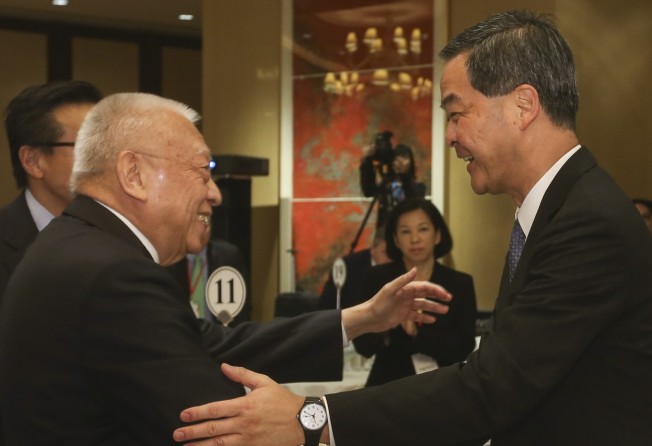Three Hong Kong leaders share one vision for city: optimism
Chief executives past, present and future say outlook is bright thanks to ‘one country, two systems’ governing formula

Three heads of Hong Kong’s government – past, present and future – gave their full vote of confidence on Monday to the “one country, two systems” formula that guarantees the city’s freedoms, tracking its performance over the last two decades and promising its continued success.
In a keynote speech at a seminar organised by the Post to mark the 20th anniversary of Hong Kong’s handover to Chinese sovereignty, incoming chief executive Carrie Lam Cheng Yuet-ngor vowed to protect the core values enshrined in the ruling formula.
With just three weeks to go before she is sworn in, Lam said it was her “foremost duty” to protect Hong Kong’s key strengths, such as its open economy, rights and freedoms, clean government and independent judiciary.
“They are our ingredients of success as an international financial centre,” she said. “Hong Kong has a strong base ... I firmly believe that we have the ability to scale even greater heights.”
Lam’s predecessor, Leung Chun-ying, whom she will take over from on July 1, told the forum that one country, two systems had been critical to the city’s progress.
Hong Kong’s economy had expanded, he noted, and its GDP per capita had also increased by 60 per cent over the last 20 years.
“If you are looking for a headline for the future of Hong Kong, I would like: the best is yet to come,” he said.
Hong Kong’s first chief executive, Tung Chee-hwa, also hailed the success of the policy, suggesting that people wanted economic and social progress, regardless of political and other divides.
“An overwhelming majority is also in favour of one country, two systems. Those who advocate independence… have little support,” he said, referring to radicals calling for the separation of Hong Kong from China.
Tung also touched upon government policies being held up by opposition lawmakers’ delaying tactics.
“Even the legislature, I believe, would also understand that Hongkongers are tired of their filibustering,” he said.
Under the Basic Law, Hong Kong’s mini-constitution, the city is guaranteed a high degree of autonomy, with its capitalist system and way of life remaining unchanged for 50 years until 2046.
While critics see the city’s autonomy under threat because Beijing’s increasingly hands-on approach, Lam insisted that “Hong Kong continued to thrive under the new constitutional order” since 1997.
“Our judiciary continues to adjudicate cases without fear or favour,” she said. “Our civil service continues to be clean, efficient and professional.”
“All these came about not out of luck but because of the one country, two systems principle, the guidance and safeguards in the Basic Law, the support of the central authorities and Hongkongers’ wisdom and resilience.”
Lam conceded that the city had become more stressful, the economy was facing many challenges, society was more polarised and young people were more disgruntled than in previous years.
However, she pledged that under her “new style of governance”, her cabinet would heed public opinion and adopt “an evidence-based, innovative and collaborative approach” in solving social problems such as housing, education and poverty.
“I am worried, but not discouraged,” she said.
Lam spoke of her administration taking on a “new and more proactive role” in promoting economic development in the city, and she reiterated an election manifesto pledge to seek a “new direction for taxation to enhance competitiveness”.
“My vision for Hong Kong is one of hope and happiness – a city we are all proud to call home,” she said.
“To achieve this vision, we need to have a society that is united, harmonious and caring. This vision is not, in reality, that far off.
“In fact, it has been Hong Kong’s way to succeed for more than half a century. We have not lost our intrinsic advantages. As long as we can connect and achieve consensus, and capitalise on our strengths, Hong Kong’s tomorrow is bright.”